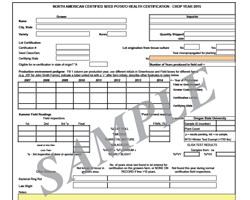North American Certified Seed Potato Health Certificate (NACSPHC)
Carol MacNeil, Extension Vegetable Specialist
Cornell Vegetable Program

About 20% of the PVY in the North American seed crop is currently PVYntn. 25% incidence of TNRD occurred in a local grower's crop from one field, resulting in very high losses. It is reported as "Mosaic" on the certificate, which includes all the PVY strains. Only buy seed lots with a very low percent of mosaic. Aphids can spread the disease from a non-necrotic ringspot susceptible "carrier" to a susceptible variety on your farm. From Meg McGrath, 8/25, Long Island Fruit & Vegetable Update - Brown leaf spots and necrotic leaf veins in the early, European variety Nadine this season were confirmed to be caused by PVYNTN. See photos of these leaves and of a plant with more typical mild symptoms, plus information about PVY. Also see images of the brown necrotic ringspots on tubers of a susceptible variety. In other varieties PVYntn only reduces yield, causing plants to produce fewer and smaller tubers. Read about varietal susceptibility to TNRD.
Common bacterial blackleg and the new, much more virulent bacterial blackleg Dickeya (BBD) aren't distinguished on the NACSPH Certificate, but are reported as "Blackleg" at this time. About 30% of potato stems in one local field wilted and died from BBD in 2015. Four fields were confirmed positive in the CVP region in 2016, and more fields were suspected. Plant pathologists are recommending that growers adopt 0% tolerance for blackleg in their seed. If any BBD was seen in a field this year check carefully for rotting tubers and the "shells" of tubers that already rotted, before harvest. Also note if yield was less than expected. 2016 incidence of BBD in Eastern and some Midwestern fields were traced to 11 ME seed producers and 2 New Brunswick, Canada, producers, of Reba, Superior, Vivaldi, Norwis, Snowden, Yukon Gold, Beacon Chipper, Kennebec and Atlantic.
North American Certified Seed Potato Health Certificate (SAMPLE) (pdf; 469KB)

Upcoming Events
African Eggplant Participatory Breeding Kick-Off
March 5, 2026
Join us to learn about the Cornell African Eggplant Research Project and learn how you can participate! African eggplant, also known as Bitterball, Garden Egg, Kittley and other names, is an important crop for many members of our community with heritage from regions such as sub-Saharan Africa, Southeast Asia, and Brazil. Since 2024, the Cornell African Eggplant Research Project has been collaborating with growers and community partners across New York to develop high-quality varieties adapted to the Northeast U.S. In this meeting, we will share information about growing and preparing African eggplant, highlight our research to date, and invite partners to collaborate with us in our 2026 participatory breeding and variety selection efforts.
COST: FREE! You must pre-register to receive the Zoom link.
Managing the Invasive Swede Midge Webinar
March 6, 2026
Swede midge is an invasive fly that causes serious economic losses to brassica crops. Due to its small size and hidden feeding habits, swede midge is often called an "invisible pest" and damage may be misdiagnosed. In this webinar, we will review the swede midge life cycle and crop damage symptoms, current management recommendations, new research findings, and highlights from on-farm case studies with a focus on organic management.
1.75 DEC pesticide recertification credits in categories 1a, 10, and 23.
Good Agricultural Practices (GAPs) Food Safety Training
March 10, 2026
Newark, NY
Learn about food safety on the farm! This event hosted by the Cornell Vegetable Program, Cornell Lake Ontario Fruit Team, CCE Wayne County, and the NYS Department of Agriculture, will cover good agricultural practices (GAPs) to help reduce the risk of microbial contamination on the farm, keeping food and consumers safe.


































